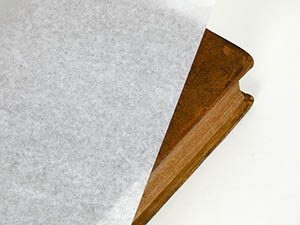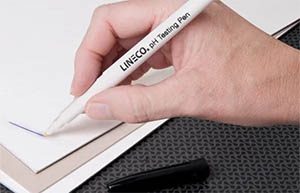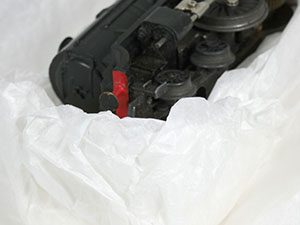Selecting Acid-Free Tissue Paper for your collection: A guide
The question may appear straightforward at first glance: what is acid-free tissue paper? However, delving into the nuanced world of acid-free tissue paper reveals that careful consideration is warranted when making a selection.

The Significance of "Acid-Free"
Before we explore the intricacies of acid-free tissue paper, it is essential to understand the concept itself. Acid-free tissue paper is characterised by its pH neutrality, typically within the range of 6.5 to 7 pH (and higher if buffered with an alkaline buffering agent). The neutral pH means that the tissue is able to safeguard against any potential harm to the objects it encloses or interacts with over time that may otherwise be caused by acids. In a nutshell, acids generally cause the premature and accelerated degradation of collections whether they are on paper, textiles, plastics and more - so for long term storage 'Acid free' is key
A critical factor to bear in mind is that paper pH levels are initially assessed shortly after their production. This means that a low-quality paper containing impurities may exhibit an initial neutral pH reading, leading to it being legitimately labelled and marketed as "acid-free." However, if this paper is in storage for an extended period, it may actually become acidic. Needless to say, exposing your valuable objects to such a paper could result in detrimental consequences.
Rely on Established Standards
When seeking acid-free tissue paper for conservation purposes, it is prudent to and seek out specific standards and trusted conservation suppliers (like us!). These credentials substantiate that the paper in question has undergone rigorous testing for longevity, for example the PAT test, providing confidence that it will indeed remain acid-free and not compromise the integrity of the objects it is intended to protect.
Confirming Tissue Paper's Acid-Free Status

Determining the acid-free status of tissue paper, especially if it has been in storage for some time, or if its quality is uncertain, necessitates verification. Fortunately, a straightforward method exists: employing a pH testing pen. A simple stroke of the pen on the tissue paper will reveal its pH level. If the result appears yellow or clear, it signifies that the paper is unsuitable for conservation purposes and should be relegated to temporary shipping or packing applications. Far better to test and use any paper appropriately than risk damage in storage, or indeed waste perfectly good material.
For those inclined towards a more scientific approach, utilising a pH meter along with water to dissolve a sample of tissue paper can provide a precise measurement of its acidity level.
Versatile Applications of Acid-Free Tissue Paper

With the assurance that your tissue paper is genuinely acid-free, a plethora of conservation applications becomes viable:
- Interleaving: Safeguard valuable documents, artwork, or books by inserting acid-free tissue paper between their pages to prevent ink transfer or damage.
- Wrapping: Shield fragile items like ceramics, glass, or textiles from harm while avoiding the risk of yellowing or deterioration.
- Cushioning: Envelop delicate objects in protective layers to shield them from scratches and impacts.
- Archival Storage: Store critical documents, photographs, or heirlooms with confidence, knowing that they are secure from the ravages of time.
Furthermore, it is worth noting that acid-free tissue paper is as recyclable as standard uncoated paper, contributing to environmentally responsible packing, shipping, and storage practices.
> | View all Tissue Papers here
Selecting the Appropriate Weight and Thickness
Just as with conventional paper, acid-free tissue paper comes in various weights and thicknesses. Your choice should align with the specific requirements of your project. In scenarios involving larger voids, or heavier items with robust surfaces, opting for a heavier weight tissue paper, such as the robust 40gsm tissue might provide extra protection. A softer, light weight tissue may be better for applications that are in contact with objects.
Watch the video below for our test to demonstrate how the different papers behave.
The Time-Honored Tissue Paper Puff
Among the most favoured uses of tissue paper in packing is the creation of tissue paper puffs. These puffs are crafted by skillfully rolling the paper's edges inward, resulting in a flat base and a cushioned top. This method offers an uncomplicated yet highly effective means of affording additional protection to your items during transit or storage.
For an in-depth tutorial on crafting tissue paper puffs, refer to our video guide. Depending on your item's dimensions and characteristics, you may discover that these puffs are an ideal solution for your packing requirements.
> | View all Tissue Papers here
In summary, when it comes to conservation and the protection of your valuable items, compromise is not an option. Ensuring the use of genuine acid-free tissue paper and selecting the appropriate weight and thickness will ensure the preservation of your treasures for generations to come. Moreover, it aligns with environmentally responsible practices in packing and storage.